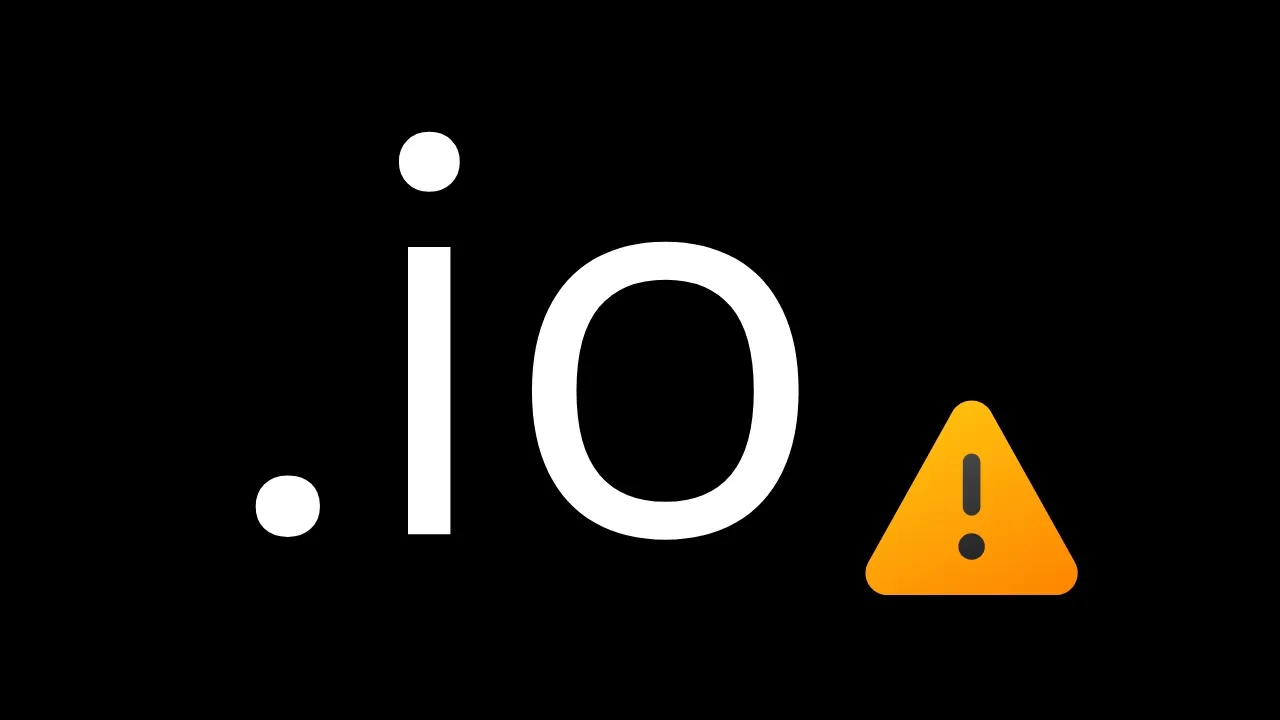Maybe people will move back to .ws. Western Samoa, but it was popularized as “website”. It was the popular misused ccTLD before .io became popular.
Or maybe this will stop ccTLD abuse.
Unlikely because we already have .website
ITT: People who think this won’t happen because they don’t understand the first thing about IANA, ICANN, their policies, ccTLDs, or the history of this kind of thing happening before. While ICANN has the authority to allow the .io domain to continue to exist, it would be a complete reversal on their newly established policy for retiring ccTLDs, which was primarily motivated by being burned on this exact type of thing happening before.
A good example is the .yu ccTLD which after a long back and forth was finally retired in 2010.
Wasn’t this news weeks ago? Is this something new?
It is to me.
I think this kind of thing is great. The policies and procedures that have been developed for the internet are going to have flaws. The internet was/is a new technology in the big picture. You can’t expect the first few drafts of how to run it to be perfect. There are going to be exceptions, edge cases and inconsistencies in any system designed to run indefinitely. This is a bug, IANA will turn it into a feature.
I don’t think that is how it works.
Some info on how these top level domains came into existence can be learned from this video
You’ll never guess the most popular internet country code
There are many ccTLD retained by ICAN after the country became non-existent. The Soviet Union is an example.
The current ccTLDs that have outlived their countries still exist because the retirement policy wasn’t finalized until 2022 and in all cases, ICANN has been moving towards retiring them.
You gave .su as an example for IANA not retiring ccTLDs, but the .su debacle is one of the major motivators behind their policy of retiring all ineligible ccTLDs.
ICANN could allow the .io domain to live on, but doing so would be a complete 180 from their current policy.
That means the British Indian Ocean Territory will cease to exist, along with the .io domain and countless websites.
That is most definitely not how it works.
That is most definitely exactly exactly how it works.
That is definitely how it works unless IANA creates an exception for the .io TLD and keeps it alive.
Yeah, and even the .su (Soviet Union) domain still exists. There is no way that a TLD as popular as .io will not remain active.
.su only exists because the ccTLD retirement policy wasn’t fully defined until recently.
.su exists in spite of the policy of IANA, not because of them. The popularity of a ccTLD has no relevance to its continued existence.
No, that is not how the ccTLD is enforced by IANA. It has sole authority, and it is not automatic is any way. There have been a total of two retired domains, one in like 95 and km 2000.
They will not retire a domain under heavy use such as .io.
Yes, that is how the ccTLD is enforced by IANA.. And it is in fact an automatic process. There is a policy for requesting a single 5 year extension, but that extension request must be accompanied by a retirement plan, otherwise by policy the ccTLD has a 5 year grace period before being removed.
They will not retire a domain under heavy use such as .io.
Heavy use has not stopped them from attempting to retire other ccTLDs, it just delays the process.
Given how popular these domains are with large tech companies, I can’t see it going away
I don’t understand why they don’t just migrate .io into a non-country code domain. Hell, they could auction it off to anybody (company, country, or person) who wants it bad enough. Let it live alongside the other custom domains.
Because two letter TLDs are reserved for countries. They made the mistake already with .su
Oh wow! And that reservation makes so much sense under these circumstances. Obviously, we could never consider the possibility of a three-letter TLD for a country or migrating a two-letter TLD to a non country specific name because reasons.
The reason is because ccTLDs need to match the alpha-2 code of the country as it exists in ISO 3166-1. This is because IANA doesn’t want to be the arbiter of which countries exist or not. You get a code, you get a ccTLD. No code, no ccTLD.
That’s exactly what will happen.
That is not what will happen. 2 letter TLDs are reserved for ccTLDs.
Yep. This is such a weird fear monger topic.
If the country that owns IO ceases to exist then IANA will just make it an ICANN generic TLD. Such a widely used TLD won’t be allowed to disappear. The rules are all made up anyway.
Two letter TLDs are reserved for countries. No gTLDs use a two letter TLD.
I guess in theory you could make a new country called “Input Output”, get ISO3166 to be updated to specify “IO” as your country’s two letter abbreviation, then request the IO TLD from IANA.
Two letter TLDs are reserved for countries. No gTLDs use a two letter TLD.
According to the rules set by the org that controls the fate of IO. They can easily change the rules if they wanted. There is a vested interest in not losing IO, and nothing but their own rule to stop them. Who’s to tell them they can’t do whatever they want in this matter?
Its so wild that domains are still country defined. And that 7 guys just have the ability to turn off all domains.
Not all TLDs are, just the ccTLDs. The .io domain was never intended to be such a popular one, but tech bros were like “zomg io! That’s like input/output!! So techie!!!” Meanwhile, .tech exists and is not country-specific but is far less popular for some reason.
Meanwhile, .tech exists and is not country-specific but is far less popular for some reason.
Simple answer: length.
Two chars look a lot better than something with more chars, and all two chars TLD are ccTLDs.
Another reason is brand identity.
Using ‘.tech’ or ‘.flights’ or .sports’ for your site feels too “on the nose” and gives vibes of like browsing some directory where things are categorised and sorted. Even worse it implies there are other sites under the same category, and those other sites may be competitors, and this dilutes strength of brand.
lt also suggests strongly what the business does, and while that might seem desirable at first it actually isn’t from a corporate perspective because it means the company becomes tied to their business area and can’t expand and grow out of it into other things.
I think this is a major part of why descriptive TLDs continue to be less preferred over ‘meaningless’ two letter TLDs, because companies want the focus to be on the main part of the domain, not the TLD.
I know someone who has a company with the word “technology” in the name, like “Smith Technology”. They use .technology because it’s literally the name of the company, which I think is good for the brand identity, but have run into issues where people just don’t think it’s a correct url because “smith.technology” looks like it’s missing its TLD.
Haha yeah. People are so accustomed to short TLDs that ‘smith.technology’ just intuitively feels kinda wrong, and it still feels that way to me, even as a tech person who knows it is perfectly valid.
You’re thinking like “smith dot technology dot what?”
deleted by creator
I generally don’t trust .io for that particular reason. It’s the Steve Jobs of the world picking that for buzz; the Steve Wozniaks of the world would simply choose .org.
And…, to make sure my joke didn’t lead me to find it Woz had a fucking io website, I looked it up and his personal cite is fucking org. Lol
Isn’t .org reserved for non-profit websites though? At least on the basis of internet etiquette? Some .io websites I know are completely monetized and about making money. And of course not everyone can afford a .com domain with a cool name right off the bat.
.com is cheaper than .io
I think they’re referring to the fact that to get a very good .com, you’ll have to buy it aftermarket (eg via Sedo, Dan, Flippa, etc) which can be very expensive. On the other hand, there’s far more domains available under country code TLDs.
deleted by creator
Good. The rampant abuse of the ccTLDs is atrocious.
Funny thing here on Lemmy…
The lemm.ee admin is Estonian I believe so it doesn’t seem like abuse.
I believe so aswell, but there is lemmy.ml for example, which apparently is meant to stand for “marxism-leninism” in that specific instance (.ml is Mali’s country TLD).
When I registered an account , I made sure to do so with an instance whose TLD is connected to something that should be around for a couple of billion years more.
.world isn’t a ccTLD, it is a gTLD.
The comment you’re replying to didn’t mention ccTLDs?
Unluckily, the .world domain is ultimately owned by Ethos Capital, which is a private company that well may cease to exist in a short time.
How do we make domains more democratic? It seems so backwards that massive corporations and groups of massive corporations are the only bodies that get to decide things like this that aren’t literally states.
ICANN isn’t really a massive organisation, it’s a technocratic non-profit with a buttload of advisory committees, including one for end users. The rules surrounding ccTLDs were tightened after Russia didn’t sunset .su, so they tried to take politics out of it, make it a wholly rules-based thing, but now it figures that the rule everyone wants to have is “decide on a case-by-case basis”.
There’s also been various initiatives regarding reform of internet governance over the decades but in the end noone can agree on what would be better so ICANN keeps on chugging on.
You know what would bring a quick end to this? If Mauritius doesn’t incorporate those islands into itself, letting them stay an autonomous territory. From British Indian Ocean Territory to Mauritian Indian Ocean Territory.
How about we just go back to .edu .gov .com .org?
Who gets .gov? The US?
Other countries never used just .gov or just .com.
Yes, only the US uses .gov. All other countries use .gov.uk where the last decimal is their country code. And any country can get a .com without a .com.uk country code attached. That has changed. All .gov are official United States government sites exclusively.
.gov (.gov.us) is used in the US to distinguish between commercial sites and sites run by state, federal, and local government institutions. It helps cut down on fraud. There are a few fucked up government sites in some states that use.com because ICANN isn’t doing their fucking job.
There’s also .mil for military sites. And .net for internet service providers. These were the original oldie domains. I’m not opppsed to adding .blog to the list, but I despise all of these confusing random cash grab domains that ICANN approves these days. “.social” is really just an org, and “.biz” is really just a com.
I think you may have missed my point.
.gov is not the same as .gov.us (in this example, .gov is not the tld, .us is) Tlds like .io belong to countries, there is no going back to .gov or .com because countries outside of the US never just used .gov or .com.
To add a bit of context:
https://www.parliament.uk/ https://www.parliament.lk/
How do you reconcile both of these websites having .gov? You can’t, you either need second level domains (.gov.uk,.gov.ik) or you would need one of them to change their name (parliamentsrilanka.gov)
.gov needs to be differentiated, and you need all of these country TLDs for that.
.gov.uk actually exists. So yes, countries outside of the US use .gov.
the tld is
.ukin that casejust take the L good lord
No, they are not using .gov they are using .uk
You can take my .moe from my cold, dead, hands (๑˘・з・˘)
Not opposed to that, but I’m more concerned with being able to get one at low cost, would need at least .net to kinda expand the pool.
You could create your own DNS server with its own routes and registrars.
If you got enough people to use your DNS network you could create your own registrars and your own rules.
Users would need to switch to your DNS, but otherwise there isn’t anything about how the Internet works that requires you to use the big dog DNS
Because they prop up the infra to support them right?
I don’t know what this is a question to.
“it seems so backwards”
They set the shit up, so they decided the behaviors.
Yes, it is rather backwards for a handful of companies to own entire blocks of IP addresses just because. The infrastructure was massively funded by public dollars, it should be publicly owned.
A fair point indeed, but that’s not how it is. Public dollars were funneled one-way into private infra, in many cases.
but that’s not how it is
Doesn’t mean it can’t be that way, though, One way nationalization also exists.
The world runs on contacts, and those dollars were spent around the globe. There are examples of what you say, with mali considering reclaiming ml. Nationalization can have a chilling effect on industry, but depending on your affiliations this isn’t really an issue
Make a p2p parallel system, cryptography-based. You subscribe to a root identity, and you fetch (via something, it can be NOSTR, it can be anything) its messages, which describe the current state of the domain list.
If you don’t like that particular name provider, you may choose some other.
There may even be some voting protocol from among few different providers, on whether to accept a name change. Then you may use a few of them simultaneously.
Easy. The hard thing is to write the software (I have Aspergers, ADHD, social anxiety, chronic cold and house pests, don’t bother me, and I’m also stupid) and to make people use it.
Something between Usenet, Fidonet and Freenet, LOL.
I trust none of the I can. People are running anything on kubernetes 😆














